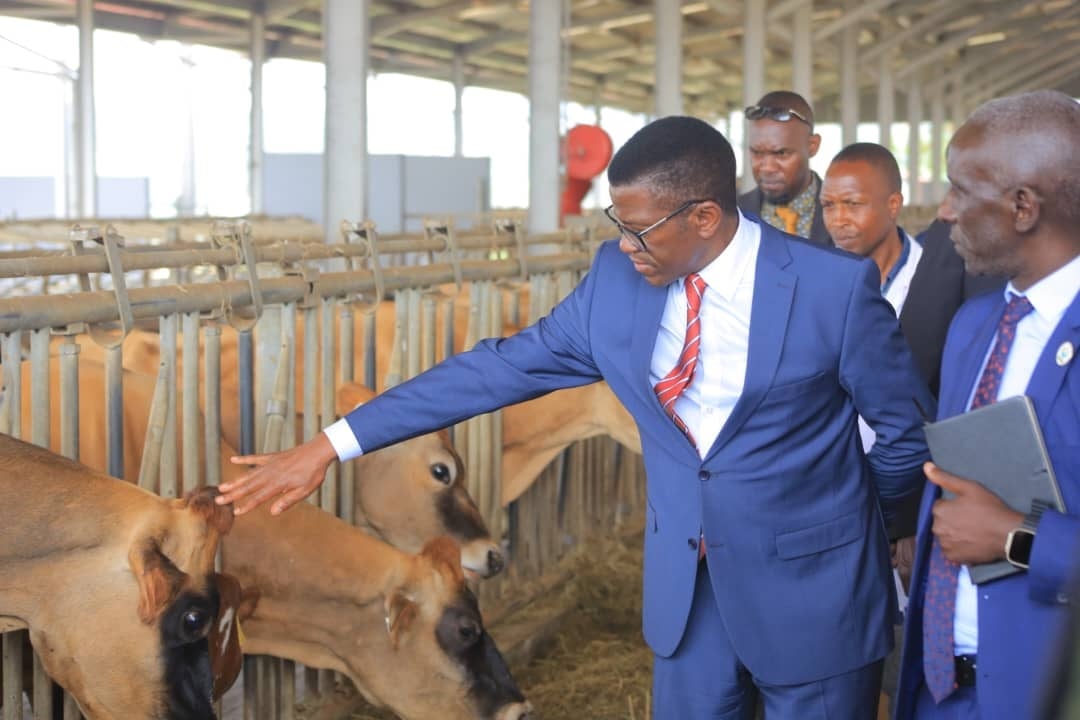Govt, AU step up efforts to boost feeds sector

Kanunu (right) feeding his dairy cows during milking for better results. PHOTO | FILE
What you need to know:
- Ms Agnes Kirabo from the Food Rights Alliance said access to water constitutes a big aspect in addressing the nutritional needs of cattle
The government, through the Ministry of Agriculture, Animal Industries and Fisheries (MAAIF), in partnership with the African Union-Inter African Bureau for Animal Resources (AU-IBAR) and the Bill and Melinda Gates Foundation (BMGF) have sought partnership to build a resilient African feed and fodder system amid global crises.
The experts say, addressing the diverse effects caused by crises such as COVID-19, Climate Change shocks and the conflict between Russia and Ukraine) on the African feed and fodder sector, as well as streamlining the sector, would check the glaring shortages and ensure business continuity and sustainable livelihoods.
Addressing participants at a stakeholders' Resilient African Feed and Fodder Systems (RAFFs) Project conference held in Kampala from March 11 to 12, Dr Annie Kigezo, a Senior Programs Officer at African Union, noted that crises coupled with the unstructured nature of the feed and fodder sector in most African countries, including Uganda, had stagnated the sector.
"The status in Uganda and other African countries was assessed last year, and it was discovered that many people are playing very many roles. They are not working together. They can’t be productive when they are not linked to other players in the value chain," he said.
Through the RAFFs project, it is anticipated that harnessing partnerships for coordinated action would galvanize impactful immediate and short-term investments, in addition to building the capacity for evidence-based decision-making and attracting investment, identifying and upscaling viable existing approaches and innovative models to address feed and fodder shortages to minimize losses.
The three-year RAFFS Project was initiated in January 2023 to assess the impact of triple crises on Africa's feed and fodder sector.
During its initial year, the project focused on selected countries including; Cameroon, Kenya, Nigeria, Somalia, Uganda, and Zimbabwe, engaging stakeholders and conducting a continental survey that recommended actions to counteract feed shortage.
Available records indicate that feed and fodder shortages have led to huge losses of livestock (over 8.9 million livestock in the Greater Horn of Africa region alone), eroded livelihoods, loss of incomes, and driving up prices of highly nutritive livestock sourced foods making them inaccessible to sections of the population that need them most.
Fodder constitutes 60 -70% of the total cost of animal production.
Dr Theophilus Mwesige, Commissioner for animal production in the Ministry of Agriculture said Uganda has the potential to meet both national and regional demands for animal feed and fodder if several measures are taken.
Some of the measures that Dr Mwesige recommended include revising obsolete laws such as the Animal Feeds Law, and the Cattle Grazing Act of 1950, extending extension services across the country, ensuring feeds are conserved, and availability of adequate nutritional labs to detect the nutritional values of the available feed and fodder.
He revealed that the national animal diagnostics centre that is available, is not well equipped to certify the quality and safety of feeds and fodder.
Dr Silver Turyahikayo, the extension and Milk Procurement Manager at Jesa Farm said, that with the current climate change, farmers should consider processing feeds into hay and silage to sustain supply during the dry seasons.
Dr Turyahikayo also emphasized proper storage of feed and fodder to prevent contamination.
Ms Agnes Kirabo from the Food Rights Alliance said access to water constitutes a big aspect in addressing the nutritional needs of cattle.
Ms Kirabo also stressed the need to sensitise farmers so that they can maintain the recommended quality of feed and fodder and also appreciate that fodder is not weed and that feed is not waste.
"Feed and fodder is food. If you can't eat it, don't give it to animals," she advised.
She called for gender equity in the feed and fodder sector.




